by M. C. Jennings | Mar 7, 2024 | Academics, Careers In..., COBA Faculty, College Decisions, Current Students, Dukes School of Finance, Financial Management, Uncategorized
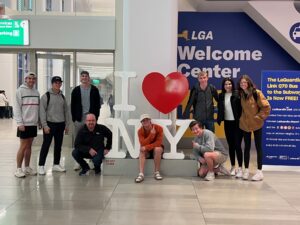 Most trips to New York City involve plenty of sightseeing, tours, shows and musicals, and expensive trips to some of the world’s best restaurants. They don’t usually involve sit-down meetings with some of the top financial minds in the country. But that was the design of a trip to New York last fall for eight students in ACU’s Dukes School of Finance.
Most trips to New York City involve plenty of sightseeing, tours, shows and musicals, and expensive trips to some of the world’s best restaurants. They don’t usually involve sit-down meetings with some of the top financial minds in the country. But that was the design of a trip to New York last fall for eight students in ACU’s Dukes School of Finance.
Those students – seven of whom are in the first cohort of the Dukes Scholars – were led on the trip by Dr. Jonathan Stewart, professor in the Dukes School of Finance. Stewart has been taking students to New York for several years, allowing them to visit some of the top financial institutions in the world and ask questions of the leaders of those companies to find out what it takes to make it in New York.
Stewart and his students were in New York from Oct. 18-22, visiting with leaders from Bank of America, Evercore, Court Square Capital Partners, Tiger Global Management, RBC Capital Markets, and Goldman Sachs. They toured Nasdaq and met with some of the leadership of the second-largest stock exchange in the world. They also met with a panel of young professionals in the finance industry who are members of the Manhattan Church of Christ.
“We had an opportunity to encourage and inspire those students to work in New York or another financial center,” Stewart said. “It’s all happening there (in New York), and we put our students in front of many talented people on the trip.
“We have a lot of students interested in investment banking, so going to Goldman Sachs and Royal Bank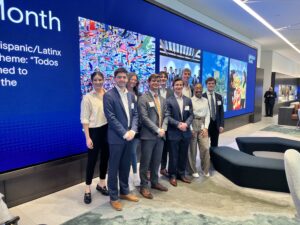 Canada (RBC) was great for them,” he said. “We went into RBC, where they set us up in the conference room, and we had people talking to us who were dealing in high-level investments and acquisitions daily.
Canada (RBC) was great for them,” he said. “We went into RBC, where they set us up in the conference room, and we had people talking to us who were dealing in high-level investments and acquisitions daily.
“Our students were able to interact with a wide range of people who had made a career out of that field, but also some in the room who were just a year or two older than our current students,” Stewart said. “That gave them a chance to interact with and ask questions of someone close to their age.”
Kaylee Smoot, a native of Corona, California, who will graduate in May with her Master’s in Accounting, said the time spent with executives of some of the top financial institutions in the country was invaluable.
“That time was priceless,” Smoot said. “We heard from many executives, including from specialized private equity firms and international finance companies, and even received a tour of the Goldman Sachs Headquarters. We had students ranging from first-year to graduate level, and we were each able to walk away with invaluable knowledge about what opportunities awaited us in our future careers.”
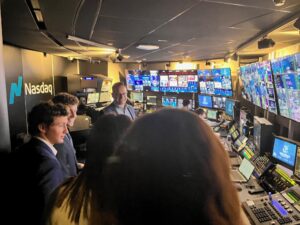 Stewart said he always gets help from ACU alums in the financial industry, using their connections and contacts with industry leaders in New York to set up the trip. One of those ACU graduates who helped this year was COBA alum Steve Swinney (‘94), based in Colorado and the CEO of Kodiak Building Partners who tapped his contacts in New York to meet with students from his alma mater.
Stewart said he always gets help from ACU alums in the financial industry, using their connections and contacts with industry leaders in New York to set up the trip. One of those ACU graduates who helped this year was COBA alum Steve Swinney (‘94), based in Colorado and the CEO of Kodiak Building Partners who tapped his contacts in New York to meet with students from his alma mater.
Swinney said he hoped his contacts showed the ACU students all that is possible for them in finance.
“The Dukes School of Finance at ACU is a tremendous opportunity for finance students to have so many career doors opened to them that maybe they haven’t had in the past,” he said. “I wanted them exposed to all that is possible for them. They must know their ACU education is preparing them for great things. We need excellent Christian finance leaders in the business world.”
A crucial part of the trip for Stewart and Smoot was discussing how faith and business mix. Stewart said that while making connections was paramount for the students, allowing those students to see that faith and high finance can mix was just as important. That’s why the panel with professed Christians who are also leaders in the financial industry was part of the tour. The time shared at Manhattan Church of Christ was to ensure the ACU students left New York knowing their faith wouldn’t be trampled in the City That Never Sleeps.
“Taking your faith into the business world might look different in New York than it would in Abilene or Dallas because there are so many perspectives and different points of view in a big city than in a place like Abilene,” Stewart said. “But to see there’s a place for Christian businessmen and businesswomen to function and contribute and be part of that world was, hopefully, a healthy opportunity for our students.”
Dallas because there are so many perspectives and different points of view in a big city than in a place like Abilene,” Stewart said. “But to see there’s a place for Christian businessmen and businesswomen to function and contribute and be part of that world was, hopefully, a healthy opportunity for our students.”
Smoot, who hopes to secure a financial analyst position in Dallas after graduation, said those conversations were the most important to her on the trip.
“In recent decades, we have seen the damage immoral and unethical behavior can do in the finance industry, with many people’s livelihoods still suffering the consequences,” she said. “To receive an education that equips you with the knowledge to be successful in finance while grounding you with Christ-centered values strengthens your chances of being a light for Christ in a world and industry that desperately needs it.
“We already see an example of this in the STAR course offered at ACU, a student-managed investment fund I had the honor of leading last semester,” Smoot said. “We are exposed to real-world dilemmas involving not only the quantitative side of the stock market but also the qualitative side of the finance industry as we discuss the financial and ethical motivations behind different investments we make on behalf of the university.”
New York City comes with preconceived notions, from the friendliness of its citizens to the high cost of living to safety. But by sitting down with those industry leaders, touring Nasdaq, taking in a show on Broadway, going through the 9/11 Museum, and giving the students time to explore the city, Stewart said he hopes the students began to see New York in a new light.
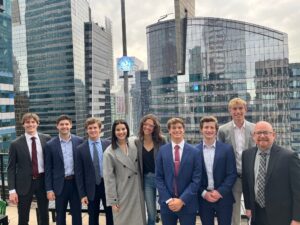 “We wanted the students to make real connections, and when you have eight students sitting in a room with three or four investment bankers, that’s a great opportunity,” Stewart said. “They had a real chance to talk to them, to exchange business cards, and network. There are so many stereotypes of New York, but it’s one of the world’s great cities, and having the experience of moving around and riding the subway and seeing the landmarks and everything that goes along with New York City was so much fun to share with those students. We see the cutthroat part of the financial industry in the movies and on TV all the time, and some of that is probably true. But many people are out there doing things the right way and have a faith background and a belief system, and they put that in action every day.”
“We wanted the students to make real connections, and when you have eight students sitting in a room with three or four investment bankers, that’s a great opportunity,” Stewart said. “They had a real chance to talk to them, to exchange business cards, and network. There are so many stereotypes of New York, but it’s one of the world’s great cities, and having the experience of moving around and riding the subway and seeing the landmarks and everything that goes along with New York City was so much fun to share with those students. We see the cutthroat part of the financial industry in the movies and on TV all the time, and some of that is probably true. But many people are out there doing things the right way and have a faith background and a belief system, and they put that in action every day.”
And for Smoot, putting some of those preconceived ideas to rest was just as important as anything else she took away from the trip.
“When you think of Wall Street, you may imagine exhausted employees working 100-plus hours a week, day trading at a giant corporation that becomes their only identity,” she said. “I’m happy I walked away realizing that while the finance industry in New York does require hard work and long hours, those individuals still have a life. And many of their companies offer impressive on-site benefits to assist with the burden long workdays may exert on them. It makes someone’s dream of working on Wall Street shift from daunting to doable, as long as you are willing to still chase after it.”
And each trip Stewart leads helps to re-energize him, he said.
“I love going to New York and being in the middle of everything,” said Stewart, who thanked Swinney, David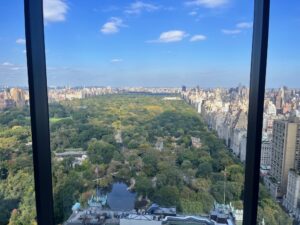 Swearingen, and Jim Litton (‘01) for their help in setting up the schedule of tours and visits. “It’s the heart of the financial world, especially in our country. I learn something new on every trip, and I come back energized, inspired, and thinking about ways I can incorporate what we’ve learned on the trips into what we’re learning in the classroom. It inspires me to stand in front of our students and encourage them to dream big and do what they want to do because they can make it happen. We are fortunate to have many people here and ACU friends and family willing to help make that happen.”
Swearingen, and Jim Litton (‘01) for their help in setting up the schedule of tours and visits. “It’s the heart of the financial world, especially in our country. I learn something new on every trip, and I come back energized, inspired, and thinking about ways I can incorporate what we’ve learned on the trips into what we’re learning in the classroom. It inspires me to stand in front of our students and encourage them to dream big and do what they want to do because they can make it happen. We are fortunate to have many people here and ACU friends and family willing to help make that happen.”
by M. C. Jennings | Feb 12, 2024 | Academics, Alumni Spotlight, Careers In..., COBA Staff, Management, Uncategorized
written by special contributor, Lance Fleming
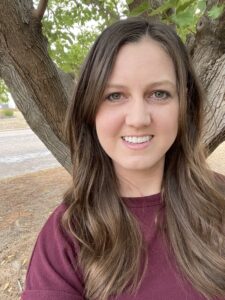 Whitney Herrington (’14) is a great believer in servant-leadership, which she saw exhibited every day while a COBA student at ACU. Perhaps that’s why she has spent the early part of her career in roles where she can best serve others, whether as the program director at a local non-profit working with women and children, as the assistant director of the Griggs Center, or in her current role as the Marketing and Development Director at Frontier Texas!.
Whitney Herrington (’14) is a great believer in servant-leadership, which she saw exhibited every day while a COBA student at ACU. Perhaps that’s why she has spent the early part of her career in roles where she can best serve others, whether as the program director at a local non-profit working with women and children, as the assistant director of the Griggs Center, or in her current role as the Marketing and Development Director at Frontier Texas!.
The emphasis on leaders serving others stuck with her, and she’s been giving back to her home community since she graduated with a Bachelor’s degree in Business Administration, and then in 2019 from the University of Victoria (British Columbia, Canada) with a Master’s in Global Business.
An Abilene native, Herrington graduated from Abilene High School in 2010 and enrolled at ACU that fall as a management major. In 2014 while finishing her degree, she began working as the A-Teens Director at the Alliance for Women and Children, working with middle-school girls during a 10-week summer camp and after-school care program. In her role, Herrington worked to help young women build their confidence and develop healthy self-esteem.
She was hired as the Assistant Director of the Griggs Center for Entrepreneurship & Philanthropy in the summer of 2016, where she worked as a teammate with many of the men and women she had taken classes under as a student just a few years before. One of those was Jim Litton, an Associate Professor in the Department of Management Sciences and the Director of the Griggs Center.
”One of the things I appreciated about my time working at the Griggs Center was that there was something new every day,” said Herrington, who worked there from 2016-19. “The energy of the students and the activity of the various projects was something I was fortunate to witness daily.”
Herrington worked closely with Litton and the Griggs Center team to implement the center’s strategic goals. She also worked on various projects, including organizing domestic trips to places like Silicon Valley in California, implementing communication strategies, and managing budgets and expense reports.
She began working at Frontier Texas! in November 2022 as the Marketing and Development Director, and even though the title is different, Herrington’s work as a servant-leader is ongoing. She works on fundraising events and connects with supporters, museum members, and donors, all to connect the community with the museum.
We recently caught up with Herrington to get her perspective on where she’s been, her experience at ACU and the Griggs Center, and her passion for entrepreneurship and servant leadership.
Q: What did you learn about yourself and working with people in that role at the Griggs Center?
Herrington: “The main thing I learned about working with people is that everyone sees the world differently, and being open to other ideas and different points of view is important. The beauty of the Griggs Center is that students (and faculty, staff, volunteers, etc.) can all benefit from thinking entrepreneurially. It’s a true skill that I am grateful I was able to continue developing during my employment. Even though I wasn’t a student, I learned each day. I always appreciated the entrepreneurial mindset and knew it would be a skill set I would value and continue to value no matter what job I held.”
Q: What professor or professors had the most profound impact on you and why?
Herrington: “This is such an interesting question because many COBA professors became my co-workers a few years after graduation! Jim Litton, of course, had a profound impact as a professor and employer. I took Jim’s Introduction to Entrepreneurship course my sophomore year, and that class was tough! But it taught me how to work through case studies at a higher level (which paid off during later undergraduate classes and into my Master’s program). As his employee, I appreciated how Jim created a supportive and collaborative work environment. Strategizing and implementing large-scale projects in such a fast-paced environment was fun. He genuinely valued the ability of our team to provide input on the projects and overall strategic plan for the Center.”
Q: What prompted you to work toward and attain your MBA?
Herrington: “As I worked in the world of academia, the thought of pursuing my Master’s degree was always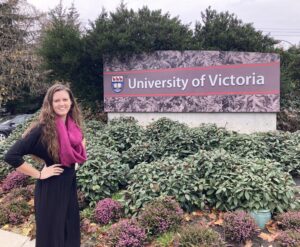 in the back of my mind. By the fall of 2019, it was time to earn that degree. I chose to study through a unique program, the Masters of Global Business, at the University of Victoria, located in British Columbia, Canada. The program is designed as a tri-continental program, where you spend several months in three countries. I started the program in January 2020, where I spent three months studying in British Columbia, but soon transitioned into a fully remote program because of the pandemic. I had always been interested in pursuing a post-graduate degree; it was just a matter of when. I have always believed in the idea of lifelong learning and wanted to broaden my knowledge base within business. I have a fascination with the global business community, and that is essentially what prompted me toward the Master of Global Business program.“
in the back of my mind. By the fall of 2019, it was time to earn that degree. I chose to study through a unique program, the Masters of Global Business, at the University of Victoria, located in British Columbia, Canada. The program is designed as a tri-continental program, where you spend several months in three countries. I started the program in January 2020, where I spent three months studying in British Columbia, but soon transitioned into a fully remote program because of the pandemic. I had always been interested in pursuing a post-graduate degree; it was just a matter of when. I have always believed in the idea of lifelong learning and wanted to broaden my knowledge base within business. I have a fascination with the global business community, and that is essentially what prompted me toward the Master of Global Business program.“
Q: Tell me about your role at Frontier Texas and what makes it work for you.
Herrington: “I started as the Marketing and Development Director at Frontier Texas in November of 2022. Some aspects of my job include developing and executing various fundraising events, writing grants, and working with our docent and volunteer base. I also assist in creating our marketing material, including our advertisements, brochures, website, and additional materials as needed. Helping maintain contact with our supporters, members, and donors is another highlight of this role as it allows me to connect with the community.”
Q: How are you applying the lessons you learned in COBA and the pursuit of your MBA to your role at Frontier Texas?
Herington: “One important lesson that I have continually been learning is the ability to be adaptable. That was especially relevant in the pursuit of my Master’s degree. My cohort shifted from a fully integrated, multi-cultural program to an online program. What I appreciated about that time, though, was that I was living out the case studies we were studying. Working in groups of individuals who were spread across the world added a level of learning in a global business context. Adapting to various opportunities and daily challenges is important in any field.”
Q: What are the lessons you learned while in COBA that you carried with you when you left ACU, and how have they shaped you in the years since you graduated?
Herrington: “It’s hard to put into words the lessons I learned while studying at COBA; it’s truly become a bit of a combination of lessons learned over time. I remember when working on a project researching the 2012 Olympic Legacy of the London Olympics. Dr. Monty Lynn was the professor and advisor for that project/course and was overseeing our research project and presentation. I remember seeing the hard work that he put into the project and creating this exciting opportunity for his students: it showed how dedication and commitment to a project are necessary no matter the stage of your career, whether you are a student or a CEO.”
Q: What do you appreciate most about your time at ACU and in COBA?
Herrington: “The opportunities to learn and grow into becoming a servant leader. The emphasis on servant leadership is a unique characteristic of COBA.”
by M. C. Jennings | Jan 31, 2024 | Academics, Alumni Spotlight, Athletics, Careers In..., COBA Faculty, College Decisions, Management
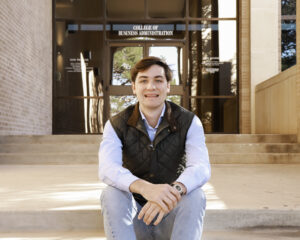 Growing up in Spain, Matias Montanes (‘23) knew he wanted to play tennis and play at the professional level. Spain is the home of great champions like current world No. 2 Carlos Alcaraz, 22-time Grand Slam champion Rafael Nadal, former world No. 1 Juan Carlos Ferrero, and doubles great Emilio Sanchez.
Growing up in Spain, Matias Montanes (‘23) knew he wanted to play tennis and play at the professional level. Spain is the home of great champions like current world No. 2 Carlos Alcaraz, 22-time Grand Slam champion Rafael Nadal, former world No. 1 Juan Carlos Ferrero, and doubles great Emilio Sanchez.
It’s a country steeped in tennis tradition, and Montanes wanted to be part of it. He began playing at a young age, and by the time he was 12, he was winning tournaments and was one of the top young players in his home country.
However, the time spent practicing took him away from other interests and made him realize that the dream of playing as a professional might not be what he wanted after all. He began to think about playing collegiately and pursuing his other dreams, like a college degree and perhaps a career as a lawyer.
That’s when he called ACU men’s head coach Juan Nunez (’09), and as soon as the two made a connection, Montanes knew he had found a new home. But two months before he was to arrive in Abilene for the start of his freshman year in the fall of 2020, he suffered a catastrophic elbow injury in a bike accident in Spain.
He came to ACU with the injury and Nunez honored his scholarship despite knowing that doctors in Spain said Montanes wouldn’t be able to play at a competitive level again. He tried to rehab the injury through the fall, but in December, he gave up tennis and began looking to return home to attend college in Spain.
But that’s when Nunez intervened and set Montanes on a path to something he truly loves: the law. As Matias explored this new road, he found mentors in faculty from ACU and COBA, especially Dr. Phil Vardiman (‘76) and Daniel Garcia (‘07). He graduated in December with a Bachelor of Business Administration (BBA), majoring in management with a minor in business leadership. Mattias has returned to Spain to study law in hopes that one day he can combine his ACU business degree with his law degree.
We recently talked to Matias and asked about his time as a tennis player, his experience at ACU and in COBA, and what’s next for him.
Q: Tell me about growing up in Spain, where you grew up, and what you wanted to be as an adult.
Montanes: I grew up in Menorca, Spain, and started playing tennis when I was four. My family and I moved to Mallorca when I was 10 because of my dad’s job. But that helped me improve my tennis game because I could practice with better tennis players and play at a good club.
Q: Growing up in Spain and playing tennis, did you have dreams of one day becoming the next Nadal or one of the other great players from Spain?
Montanes: When I was 12, I started to win Spanish and European championships. I was in the top three in Spain and maintained that level until I was 16. During that time, I beat players like Carlos Alcaraz (he’s number 2 in the world now), Arthur Cazaux (number 122 ATP right now), and Pablo Llamas (160 ATP right now). I wanted to be a professional tennis player, and that was everything I was seeing in my future. I practiced five hours per day every day of the week for six years. When I turned 17, I finally realized how hard it was to become a professional tennis player.
Q: Was tennis always the way you planned to get your education, and how did you come to learn about ACU?
Montanes: I had a hard-working mentality during my career, but that’s not enough. You must have something special, but I didn’t have it to get to that next level. I started to look for universities in the United States after I realized that. I had to find other goals in my life other than tennis. Tennis wasn’t going to provide me with a living. I started talking to some colleges, but as soon as I spoke with Juan Nunez, I knew that ACU was the place to go. Two months before I arrived at ACU, I had a bike accident, breaking my elbow into 18 pieces. The doctors had to put me in a cast and warned me that I wouldn’t be able to play tennis anymore. I didn’t want to believe them. I called Juan, and he didn’t believe them either. I traveled to Texas and visited more doctors. We had faith, but that wasn’t enough. I started to play tennis, and my elbow was getting worse every day. In December 2020, I decided to stop and start looking for colleges in Spain, but Juan allowed me to be his assistant coach, maintaining my scholarship.
Q: What were your first impressions of ACU and Abilene, and how did those change during the years you were here?
Montanes: My first semester, I didn’t like ACU. I came from the Catholic Church, and it was a change. I wanted to return to Spain; I had all my family, friends, and girlfriend there, but the opportunity Juan gave me was too big; one of those opportunities that only happens once in your life. Finally, I decided to stay. My tennis career changed in January 2021 when I started coaching as a freshman. As a second-year student, I began studying law in Spain, thanks to an online program. Being an assistant, attending Business school at ACU, and law school in Spain wasn’t easy, but I made it through.
Q: I know Dr. Phil Vardiman and Daniel Garcia were integral in your pursuit of a business management degree. Can you expound on how much those two men have impacted your life?
Montanes: I was lucky to have professors like Dr. Vardiman and Daniel. We made a special connection from the beginning. They knew everything I was going through and always supported me. They taught me life lessons without words but facts.
Q: What was the total COBA experience like for you, and what lessons did you learn that will stay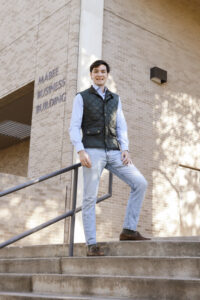 with you?
with you?
Montanes: I learned to be a servant business leader, a lesson I will always carry. I realized how good people can be in this world. Before coming to ACU, I never thought that people like this existed. But, thanks to ACU, I know the kind of husband, dad, and son I want to become. It took me some years, but now I’m conscious about it.
Q: How did you become interested in studying the law, and what kind of law degree are you working toward in Spain?
Montanes: I was always interested in law. If I had to choose a major in Spain, it would have been law. I saw the opportunity when I became an assistant because I wasn’t arriving home tired. I was coaching, not practicing. I think both majors (business and law) combine very well. You’d better know the law if you have your own business.
Q: How will you use your law degree, and do you want to merge your ACU degree with your law degree in your professional career?
Montanes: I’d like to find a business job with a multinational company and see how it looks in practice. Once I graduate from law school, I will decide whether to become a lawyer or use my law knowledge in a business position.
Q: What is the one thing you miss about Texas and ACU?
Montanes: The people. I miss the people at ACU and in Texas.
by M. C. Jennings | Nov 2, 2023 | Academics, Accounting, Careers In..., COBA Events, COBA Faculty, COBA Staff, College Decisions, Current Students, Outcomes, Professional Development, Uncategorized
written by special contributor Lance Fleming
Each year, ACU’s College of Business Administration (COBA) graduates students ready to move into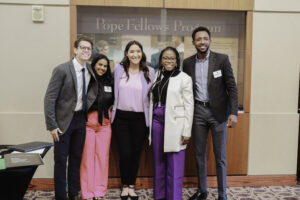 professional fields in numerous types of businesses at every level of an organization. Sometimes, it’s in a company run by an ACU alum who wants to help students at their alma mater secure employment. Other times, it’s a global brand looking for the best and the brightest employees.
professional fields in numerous types of businesses at every level of an organization. Sometimes, it’s in a company run by an ACU alum who wants to help students at their alma mater secure employment. Other times, it’s a global brand looking for the best and the brightest employees.
Whatever the case might be and whatever employers are looking for, more often than not, ACU graduates – and in particular, ACU COBA graduates – are usually at the head of the line when it comes to new hires each summer.
So it shouldn’t be surprising that more than 50 companies from across the state and Oklahoma were represented on Thursday, Oct. 5, for the first joint Career Fair sponsored by COBA and the Department of Engineering and Physics at the Hunter Welcome Center. COBA also has in-house career preparation led by Professional Development and Internship Director Jasmine McCabe-Gossett. Students also have access to the ACU Virtual Career Center with resources to help them create resumes and cover letters.
McCabe-Gossett (2010), who joined COBA last year, sensed a need for a Career Fair. After months of preparation, on October 5, that happened giving COBA students a chance to sit across from potential employers, put their resumes in front of them, and allow them to talk about themselves and what skills they would bring to an organization.
 Various companies with both a local and international presence participated in the fair, providing our students with options that appealed to all. Business and technology students were able to engage with companies within the following industries: real estate, hospitality, IT services, consulting, distribution, financial services, sales, healthcare and more. One student noted, “I have never attended a career fair, but it was great! It was so cool to be able to see many different options in internships, companies, and people!”
Various companies with both a local and international presence participated in the fair, providing our students with options that appealed to all. Business and technology students were able to engage with companies within the following industries: real estate, hospitality, IT services, consulting, distribution, financial services, sales, healthcare and more. One student noted, “I have never attended a career fair, but it was great! It was so cool to be able to see many different options in internships, companies, and people!”
These companies weren’t just looking for full-time employees, either. Internships have become a way for companies to put a student and potential future employee through an on-the-job interview, a point McCabe-Gossett tried to drive home to some of her students going into the Career Fair.
“We want to connect students with employers, especially students looking for full-time employment,” she said. “But a considerable focus is to connect employers to potential interns. In the lead-up to the event, we hosted several different workshops to help students feel comfortable and confident, starting with a workshop focused on identifying personal values and what it looks like to live out your faith in the workplace authentically. We had a panel of professionals who came in and spoke about that.
“The Career Fair turned out to be geared more toward internships,” McCabe-Gossett said. “During this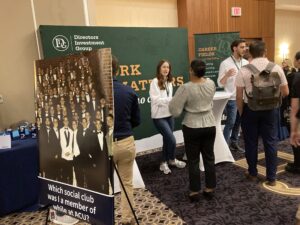 season, many companies are laying off employees, but we know it’s still strategically important to build a pipeline, and internships are a big part. I told the students not to dismiss the internship experience because it’s a great foundation\opportunity that can open doors for them. Some students were disappointed, but I tried to help re-frame their thinking regarding how you leverage an internship.”
season, many companies are laying off employees, but we know it’s still strategically important to build a pipeline, and internships are a big part. I told the students not to dismiss the internship experience because it’s a great foundation\opportunity that can open doors for them. Some students were disappointed, but I tried to help re-frame their thinking regarding how you leverage an internship.”
Another area where McCabe-Gossett and others helping her with the Career fair tried to re-form thinking centered around the experiences students might have working as interns or part-time workers at faith-based camps or events. While that experience fits neatly into the ACU experience, sometimes it doesn’t catch the eye of a potential employer, something McCabe-Gossett said she tried to help some students with as they prepare themselves to hit the job market.
“A lot of times, our students have faith-based experiences, so we talked about how to translate those experiences to a compelling resume and what values they can bring to the workplace,” she said. “Those are wonderful experiences, but we also want our students to be able to go toe-to-toe with anyone for any job. This is beyond talking about what you did but digging into how you did your job and the result.”
And this year’s success has McCabe-Gossett already thinking about the 2024 Career Fair.
 “We’ve had Meet the Firm Nights in the past, which was specific to accounting majors, and that’s wonderful,” she said. “But I wanted to cast a wider net this year and probably a wider one next year. It was a heavy lift, but I’m glad we did it because I now have this Career Fair to show potential employers. We have ACU alumni who are killing it in the business world, and they’re in positions of power, so why not ask them to come back here and represent their companies? I’m trying to create a playbook to present to alumni who work at Google or AT&T or wherever to help convince them they should come back here and represent their company at future events.”
“We’ve had Meet the Firm Nights in the past, which was specific to accounting majors, and that’s wonderful,” she said. “But I wanted to cast a wider net this year and probably a wider one next year. It was a heavy lift, but I’m glad we did it because I now have this Career Fair to show potential employers. We have ACU alumni who are killing it in the business world, and they’re in positions of power, so why not ask them to come back here and represent their companies? I’m trying to create a playbook to present to alumni who work at Google or AT&T or wherever to help convince them they should come back here and represent their company at future events.”
For more information on professional development in COBA, email Jasmine McCabe-Gossett at jcj05c@acu.edu.
by M. C. Jennings | Oct 19, 2023 | Academics, Careers In..., COBA Faculty, COBA Staff, College Decisions, Computer Science, Current Students, Faith Infusion, School of Information Technology and Computing, Student Spotlights
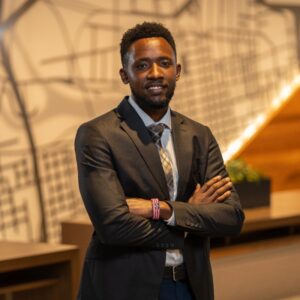 written by special contributor Lance Fleming
written by special contributor Lance Fleming
Fabrice Mpozenzi spent his summer internship working for JP Morgan Chase in Wilmington, Delaware, where he had the opportunity to get in on the ground floor of working on the front end and back end of web applications and other projects meant to further his understanding of the business.
The junior computer science major from Rwanda also worked on a business with a team of interns, which was eventually presented to senior executives for implementation. Mpozenzi’s internship fueled his desire to work as a software engineer after he graduates from ACU.
We recently caught up with Mpozenzi to get his insights on his summer internship and how ACU prepared him to work with JP Morgan Chase.
Q: What did you do in your internship?
Mpozenzi: “I had a chance to work on several different projects. I worked on a web application’s front and back end and presented it to a team of engineers, including my manager. I also had an opportunity to collaborate with other interns to work on a business plan project that we presented to senior executives.”
Q: What was your favorite part of the internship?
Mpozenzi: “What I loved most about my internship was the opportunity to shadow other teams to see the projects they were working on and learn from them. I also loved networking with different people at the company.”
Q: What are the most significant lessons you learned in your internship?
Mpozenzi: “The internship taught me two things: learning is a journey that never ends because there’s always going to be something new to learn, and one must stay hungry and motivated to learn new skills. I also learned that asking questions, especially in the workplace, is an art that unlocks knowledge and fosters a deeper understanding.”
Q: How do you see this experience aiding you in the future?
Mpozenzi: “It’s given me a roadmap to an industry that I would like to contribute to in the future, and I made connections with people from diverse backgrounds that I believe are going to be helpful in my future endeavors.”
Q: What are your plans after graduation?
Mpozenzi: “I plan to work with a Fintech company as a software engineer.”
Q: Do you have any tips for future interns or students looking for internships?
Mpozenzi: “I would tell students looking for internships to stay proactive and seek support from the professional development team. Also, stay informed about your industry, and once you secure an internship, make the most of the experience by learning and networking.”
Q: How has your time at ACU prepared you for this internship, employment, or graduate school after graduation?
Mpozenzi: “The academic coursework at ACU has equipped me with a solid foundation of knowledge and problem-solving skills relevant to my field. ACU’s professional development services, including resume workshops and interview coaching, have also helped me refine my professional presentation. These resources have prepared me for this internship and laid the groundwork for my post-graduation plans.”
Q: What’s been your most memorable experience as a business or technology student at ACU?
Mpozenzi: “My favorite thing about being a technology student at ACU is the supportive faculty and the vibrant student community that has created an environment where I can collaborate and engage in meaningful discussions with peers. ACU’s commitment to fostering a strong community has enriched my academic experience.”
by M. C. Jennings | Oct 10, 2023 | Academics, Careers In..., COBA Faculty, College Decisions, Current Students, Marketing, Outcomes, Professional Development, Student Spotlights, Student Spotlights, Uncategorized
Written by special contributor, Lance Fleming
When most people go to Arkansas in the summer, it’s to take advantage of some of the great outdoor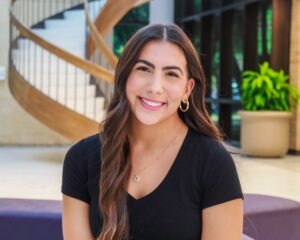 activities offered by “The Natural State,” such as fishing, kayaking and canoeing, exploring lakes and rivers, hiking, mountain biking, and visiting national parks and nature centers for which the state is known.
activities offered by “The Natural State,” such as fishing, kayaking and canoeing, exploring lakes and rivers, hiking, mountain biking, and visiting national parks and nature centers for which the state is known.
But Bryanna Monteiro spent her summer as an intern for the state’s most visible business: Walmart. Instead of spending her days outside enjoying what Arkansas offers, she was working inside on networking and connectivity. Her work paid off, however, as the senior marketing major from Orlando, Florida, earned an offer and accepted a job with Walmart that will begin after she graduates from ACU.
We recently caught up with Monteiro to get a sense of her internship and how ACU prepared her for her work in the summer and beyond.
Q: What did you do in your internship?
Monteiro: “I was a merchandising intern in Department 72: Networking and Connectivity. I was given a project over the summer: content quality score acceleration within our department. At the end of the internship, I presented the project to leadership, where I talked about my strategy for what items to remove, move, and improve.”
Q: What was your favorite part of the internship?
Monteiro: “All the valuable experience it gave me because of all the incredible people I met, from other interns to people who work internally at Walmart and external people Walmart works with. I feel like I learned so much from getting to hear others’ experiences as well as the wisdom they were able to share with me.”
Q: What are the most significant lessons you learned in your internship?
Monteiro: “The importance of progress over perfection and focusing on opportunities and growth rather than just the challenges that may arise with things out of your control. There is always more to do, and moving forward even when things don’t go to plan is essential.”
Q: How do you see this experience aiding you in the future?
Monteiro: “This was truly the most incredible experience because I learned to be confident in my abilities and skills without being afraid to share my input. I met so many amazing people who supported me but also challenged and pushed me so that I would grow both personally and professionally.”
Q: Is this job leading to full-time employment with Walmart? If not, what are your plans after graduation?
Monteiro: “Yes, it is! I will be moving to Bentonville, Arkansas, post-graduation.”
Q: Do you have any tips for future interns or students looking for internships?
Monteiro: “Do an internship!! I cannot stress this enough. I don’t believe there is such a thing as looking back and regretting not having done more internships. Be yourself and know what you’re passionate about/what you are good at so you can find the right fit for you. Connect with your professors and anyone you meet; that will be important when looking for opportunities. Finally, ensure you intern at a company you see yourself working at or are open to because it could lead to future opportunities, and you won’t waste your time.”
Q: How has your time at ACU prepared you for this internship, employment, or graduate school after graduation?
Monteiro: “My time at ACU prepared me for this internship/future post-graduation job because I am an individual rather than just a number at this school. My professors have supported and encouraged me in every aspect: in class and when I was preparing to take on this internship. All my courses have equipped me with the skills necessary to succeed in my role. ACU provided me with all the additional resources I could use when preparing.”
Q: What’s been your most memorable experience as a business student at ACU?
Monteiro: “The application side of every class I have taken because it allowed me to take what I am learning and use it in scenarios I may encounter later. I love COBA’s community aspect in that all the professors want you to succeed and are the biggest support system in helping you achieve your goals.”
 Most trips to New York City involve plenty of sightseeing, tours, shows and musicals, and expensive trips to some of the world’s best restaurants. They don’t usually involve sit-down meetings with some of the top financial minds in the country. But that was the design of a trip to New York last fall for eight students in ACU’s Dukes School of Finance.
Most trips to New York City involve plenty of sightseeing, tours, shows and musicals, and expensive trips to some of the world’s best restaurants. They don’t usually involve sit-down meetings with some of the top financial minds in the country. But that was the design of a trip to New York last fall for eight students in ACU’s Dukes School of Finance.  Canada (RBC) was great for them,” he said. “We went into RBC, where they set us up in the conference room, and we had people talking to us who were dealing in high-level investments and acquisitions daily.
Canada (RBC) was great for them,” he said. “We went into RBC, where they set us up in the conference room, and we had people talking to us who were dealing in high-level investments and acquisitions daily.  Stewart said he always gets help from ACU alums in the financial industry, using their connections and contacts with industry leaders in New York to set up the trip. One of those ACU graduates who helped this year was COBA alum Steve Swinney (‘94), based in Colorado and the CEO of Kodiak Building Partners who tapped his contacts in New York to meet with students from his alma mater.
Stewart said he always gets help from ACU alums in the financial industry, using their connections and contacts with industry leaders in New York to set up the trip. One of those ACU graduates who helped this year was COBA alum Steve Swinney (‘94), based in Colorado and the CEO of Kodiak Building Partners who tapped his contacts in New York to meet with students from his alma mater.  Dallas because there are so many perspectives and different points of view in a big city than in a place like Abilene,” Stewart said. “But to see there’s a place for Christian businessmen and businesswomen to function and contribute and be part of that world was, hopefully, a healthy opportunity for our students.”
Dallas because there are so many perspectives and different points of view in a big city than in a place like Abilene,” Stewart said. “But to see there’s a place for Christian businessmen and businesswomen to function and contribute and be part of that world was, hopefully, a healthy opportunity for our students.”  “We wanted the students to make real connections, and when you have eight students sitting in a room with three or four investment bankers, that’s a great opportunity,” Stewart said. “They had a real chance to talk to them, to exchange business cards, and network. There are so many stereotypes of New York, but it’s one of the world’s great cities, and having the experience of moving around and riding the subway and seeing the landmarks and everything that goes along with New York City was so much fun to share with those students. We see the cutthroat part of the financial industry in the movies and on TV all the time, and some of that is probably true. But many people are out there doing things the right way and have a faith background and a belief system, and they put that in action every day.”
“We wanted the students to make real connections, and when you have eight students sitting in a room with three or four investment bankers, that’s a great opportunity,” Stewart said. “They had a real chance to talk to them, to exchange business cards, and network. There are so many stereotypes of New York, but it’s one of the world’s great cities, and having the experience of moving around and riding the subway and seeing the landmarks and everything that goes along with New York City was so much fun to share with those students. We see the cutthroat part of the financial industry in the movies and on TV all the time, and some of that is probably true. But many people are out there doing things the right way and have a faith background and a belief system, and they put that in action every day.”  Swearingen, and Jim Litton (‘01) for their help in setting up the schedule of tours and visits. “It’s the heart of the financial world, especially in our country. I learn something new on every trip, and I come back energized, inspired, and thinking about ways I can incorporate what we’ve learned on the trips into what we’re learning in the classroom. It inspires me to stand in front of our students and encourage them to dream big and do what they want to do because they can make it happen. We are fortunate to have many people here and ACU friends and family willing to help make that happen.”
Swearingen, and Jim Litton (‘01) for their help in setting up the schedule of tours and visits. “It’s the heart of the financial world, especially in our country. I learn something new on every trip, and I come back energized, inspired, and thinking about ways I can incorporate what we’ve learned on the trips into what we’re learning in the classroom. It inspires me to stand in front of our students and encourage them to dream big and do what they want to do because they can make it happen. We are fortunate to have many people here and ACU friends and family willing to help make that happen.” Whitney Herrington (’14) is a great believer in servant-leadership, which she saw exhibited every day while a COBA student at ACU. Perhaps that’s why she has spent the early part of her career in roles where she can best serve others, whether as the program director at a local non-profit working with women and children, as the assistant director of the Griggs Center, or in her current role as the Marketing and Development Director at Frontier Texas!.
Whitney Herrington (’14) is a great believer in servant-leadership, which she saw exhibited every day while a COBA student at ACU. Perhaps that’s why she has spent the early part of her career in roles where she can best serve others, whether as the program director at a local non-profit working with women and children, as the assistant director of the Griggs Center, or in her current role as the Marketing and Development Director at Frontier Texas!. in the back of my mind. By the fall of 2019, it was time to earn that degree. I chose to study through a unique program, the Masters of Global Business, at the University of Victoria, located in British Columbia, Canada. The program is designed as a tri-continental program, where you spend several months in three countries. I started the program in January 2020, where I spent three months studying in British Columbia, but soon transitioned into a fully remote program because of the pandemic. I had always been interested in pursuing a post-graduate degree; it was just a matter of when. I have always believed in the idea of lifelong learning and wanted to broaden my knowledge base within business. I have a fascination with the global business community, and that is essentially what prompted me toward the Master of Global Business program.“
in the back of my mind. By the fall of 2019, it was time to earn that degree. I chose to study through a unique program, the Masters of Global Business, at the University of Victoria, located in British Columbia, Canada. The program is designed as a tri-continental program, where you spend several months in three countries. I started the program in January 2020, where I spent three months studying in British Columbia, but soon transitioned into a fully remote program because of the pandemic. I had always been interested in pursuing a post-graduate degree; it was just a matter of when. I have always believed in the idea of lifelong learning and wanted to broaden my knowledge base within business. I have a fascination with the global business community, and that is essentially what prompted me toward the Master of Global Business program.“ Growing up in Spain, Matias Montanes (‘23) knew he wanted to play tennis and play at the professional level. Spain is the home of great champions like current world No. 2 Carlos Alcaraz, 22-time Grand Slam champion Rafael Nadal, former world No. 1 Juan Carlos Ferrero, and doubles great Emilio Sanchez.
Growing up in Spain, Matias Montanes (‘23) knew he wanted to play tennis and play at the professional level. Spain is the home of great champions like current world No. 2 Carlos Alcaraz, 22-time Grand Slam champion Rafael Nadal, former world No. 1 Juan Carlos Ferrero, and doubles great Emilio Sanchez. with you?
with you? professional fields in numerous types of businesses at every level of an organization. Sometimes, it’s in a company run by an ACU alum who wants to help students at their alma mater secure employment. Other times, it’s a global brand looking for the best and the brightest employees.
professional fields in numerous types of businesses at every level of an organization. Sometimes, it’s in a company run by an ACU alum who wants to help students at their alma mater secure employment. Other times, it’s a global brand looking for the best and the brightest employees.  Various companies with both a local and international presence participated in the fair, providing our students with options that appealed to all. Business and technology students were able to engage with companies within the following industries: real estate, hospitality, IT services, consulting, distribution, financial services, sales, healthcare and more. One student noted, “I have never attended a career fair, but it was great! It was so cool to be able to see many different options in internships, companies, and people!”
Various companies with both a local and international presence participated in the fair, providing our students with options that appealed to all. Business and technology students were able to engage with companies within the following industries: real estate, hospitality, IT services, consulting, distribution, financial services, sales, healthcare and more. One student noted, “I have never attended a career fair, but it was great! It was so cool to be able to see many different options in internships, companies, and people!” season, many companies are laying off employees, but we know it’s still strategically important to build a pipeline, and internships are a big part. I told the students not to dismiss the internship experience because it’s a great foundation\opportunity that can open doors for them. Some students were disappointed, but I tried to help re-frame their thinking regarding how you leverage an internship.”
season, many companies are laying off employees, but we know it’s still strategically important to build a pipeline, and internships are a big part. I told the students not to dismiss the internship experience because it’s a great foundation\opportunity that can open doors for them. Some students were disappointed, but I tried to help re-frame their thinking regarding how you leverage an internship.” “We’ve had Meet the Firm Nights in the past, which was specific to accounting majors, and that’s wonderful,” she said. “But I wanted to cast a wider net this year and probably a wider one next year. It was a heavy lift, but I’m glad we did it because I now have this Career Fair to show potential employers. We have ACU alumni who are killing it in the business world, and they’re in positions of power, so why not ask them to come back here and represent their companies? I’m trying to create a playbook to present to alumni who work at Google or AT&T or wherever to help convince them they should come back here and represent their company at future events.”
“We’ve had Meet the Firm Nights in the past, which was specific to accounting majors, and that’s wonderful,” she said. “But I wanted to cast a wider net this year and probably a wider one next year. It was a heavy lift, but I’m glad we did it because I now have this Career Fair to show potential employers. We have ACU alumni who are killing it in the business world, and they’re in positions of power, so why not ask them to come back here and represent their companies? I’m trying to create a playbook to present to alumni who work at Google or AT&T or wherever to help convince them they should come back here and represent their company at future events.” written by special contributor Lance Fleming
written by special contributor Lance Fleming activities offered by “The Natural State,” such as fishing, kayaking and canoeing, exploring lakes and rivers, hiking, mountain biking, and visiting national parks and nature centers for which the state is known.
activities offered by “The Natural State,” such as fishing, kayaking and canoeing, exploring lakes and rivers, hiking, mountain biking, and visiting national parks and nature centers for which the state is known.